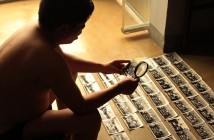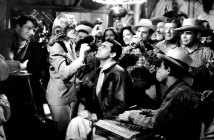
Editor’s Note: The following review is part of our coverage of TIFF’s winter film series On the Road: The Films of Wim Wenders. For more information, visit tiff.net and follow TIFF on Twitter at @TIFF_NET.
Wings of Desire starts with a man jotting down the story of a universal child who didn’t know it was a child. Titles come up as if they were scratched up on a blackboard. An eye looks up into the sky and the camera fades into a slowly moving aerial shot from above the tenements of Berlin. An angel with fading wings, Damiel (Bruno Ganz), looks on from a tower and a harp plays melodiously as a violin joins the song mournfully.
This is a dimension where unseen (but for children) angels witness, catalogue, and listen in on the ruminations of people. The flood of information is taken in thoughtfully and slowly.
Children spot the angel on a tower regarding him in awe. Then the bustle of traffic, the people of Berlin commuting, existing starts the film’s whirlpool of movement through space versus captured moments in time. The angels Damiel and Cassiel (Otto Sander) listen in to the thoughts of the people in the city. This is where time kind of stands still. An old man, a poet, and Holocaust survivor (Curt Bois), wonders what will become of the city and its people without him. People die and history fades, much like thoughts are produced, but they fade into a mixture of unreliable diaphanous images. This is the peripheral setting of the film. This is a dimension where unseen (but for children) angels witness, catalogue, and listen in on the ruminations of people. The flood of information is taken in thoughtfully and slowly. Thoughts come out like poetry or an oral history of the present reflecting on the now and questioning identity in the future. This is the macrocosm that encompasses the narrative in the movie.
At the core of the film is the story of the angel Damiel who is fascinated by the idea of an ongoing framework called Time. Falling in love with a beautiful trapeze artist, Marion (Solveig Dommartin), anchors him from the flow of the earthly world around him. He is excited about being a part of it and has given no thought to the pain of eventual death nor is he afraid of what being human will mean to him. In his domain as an angel, he meets Peter Falk (who plays himself in the film). He reveals himself as someone aware of Damiel’s predicament, empathizes with his joy for a mortal life.
 “The primeval river has dried up, and only today’s raindrops still quiver…” - Damiel
“The primeval river has dried up, and only today’s raindrops still quiver…” - Damiel
Falk is an interesting character because, although it is speculated that he might be a former angel, his view on the cast of the film he is working on in this film (a fun meta mise en scène, considering everyone in the film remembers him as Columbo), is an interesting take on acting and directing. For example, as the camera pans up in large warehouse made to look like Nazi bunker and above the detritus of the bunker ceiling, sits Falk sketching an extra from the film. We see the film being filmed being set up and above its visage are two actors: one contemplating his career (Falk), the other just waiting for his turn in the film’s scene. A random spotlight focuses on the two figures. It’s a simple shot, but one that can denote so many things. If Falk is a former angel, then he is trying to decipher the meaning in the moment as a human, as opposed to just being aware of everything as angel. This runs parallel to a director’s job: trying to gauge a character’s place, the symbolism of the objects in the scene, and making it all work together. The actor regards. The director creates the regard, or rather the conditions for it.
This is poetic nature from which Wenders works from. While hypnotizing his audience with words, and especially his incredible taste in soundtracks (Wings Of Desire has probably one of the most incredible tunes steeped in nostalgia now), his prose is in the spectacle of expansive and meaningful settings.
When the camera looks on in the view of a human, the world turns into luminous colours, whereas the views of the angels are not just black and white, but grey. Everyone is seen with the same eyes and heard with the same years, because they are all the same and one in the city of Berlin. When Damiel watches Marion undress in her camper, hues brilliant pink, yellows, and blues light up the screen. Is it Damiel seeing through human eyes, or is it the audience?
This is poetic nature from which Wenders works from. While hypnotizing his audience with words, and especially his incredible taste in soundtracks (Wings Of Desire has probably one of the most incredible tunes steeped in nostalgia now), his prose is in the spectacle of expansive and meaningful settings. These magical spaces set off the ideal environment for when an angel meets the beautiful human he has been watching over. Nick Cave casts a spell with his voice in the background, appearing to mutter words of disconnect and discontent. The world is a beautiful tragedy, like a circus set in motion to the beat of the city’s ever evolving heart.
Poetic and hypnotizing. Wim Wenders's Wings of Desire is an expansive, magical tale of angels and humans, of history and humanity.



